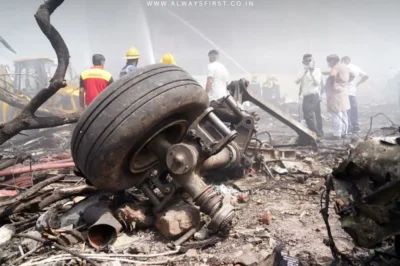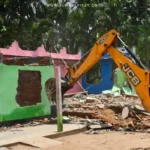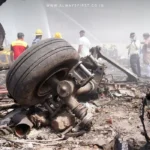Key Points:
- US report claims cockpit recordings suggest the Air India captain turned off fuel control switches before the crash.
- Pilots’ body protests, calling the preliminary findings premature and demanding a transparent probe.
- Government warns against speculation, stating the final report may take up to a year.
Air India Crash Probe: Did the Captain Cut Fuel Supply? Controversy Erupts Over US Report
A startling report by The Wall Street Journal, citing US officials, has claimed that the captain of the ill-fated Air India flight may have deliberately cut fuel supply to the engines moments before the plane crashed. The revelation has sparked outrage among pilot associations, who argue that assigning blame before a full investigation is irresponsible.
What the US Report Says
According to The Wall Street Journal, black box recordings indicate that Captain Sumeet Sabharwal, a veteran pilot with over 15,600 flying hours, moved the fuel control switches from “run” to “cutoff” shortly after takeoff. First Officer Clive Kunder, with 3,400 hours of experience, reportedly questioned the action, but the aircraft—a Boeing 787 Dreamliner—plunged into a hostel building near Ahmedabad airport, killing all 260 people on board and 19 on the ground.
Pilots’ Body Slams “Premature” Blame
The Federation of Indian Pilots (FIP) has strongly objected to the preliminary findings, calling the exclusion of pilot representatives from the investigation “deeply concerning.” In a statement, the FIP said, “Assigning blame without a thorough, data-driven probe is reckless and undermines aviation safety.”
What the Initial Probe Found
The Aircraft Accident Investigation Bureau (AAIB) had earlier noted that the fuel switches shifted to “cutoff” within seconds of takeoff but did not confirm whether it was a manual action. Experts say accidental movement of these switches is highly unlikely. Air India later inspected its Boeing 787 fleet and found no mechanical issues with the fuel control mechanisms.
Government Urges Caution
Amid rising speculation, the Indian government has labeled the report as preliminary and cautioned against drawing conclusions. A final report, expected in a year, will provide definitive answers.
As investigations continue, the aviation community remains divided—was this a tragic human error, or does the truth lie deeper? For now, the world awaits clarity.





































Leave a Reply